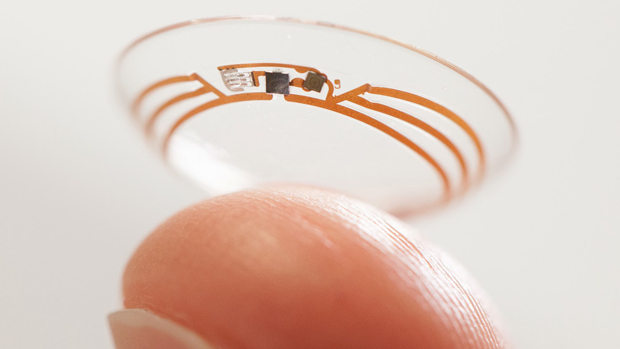Google contact lens: is this the future for diabetes sufferers?
Prototype for smart contact lens could lead to a new way for diabetics to manage their disease

A free daily email with the biggest news stories of the day – and the best features from TheWeek.com
You are now subscribed
Your newsletter sign-up was successful
GOOGLE has revealed a new "smart contact lens" designed to help diabetics by monitoring glucose levels in tears.
The technology is being developed by Google[x], the clandestine laboratory in Mountain View California, known for futuristic projects such as the self-driving car and Google Glass.
Now the team has created special miniaturised electronics capable of taking glucose readings from tears. The sensors, sandwiched between two layers of a soft contact lens, are said to be so small that they "look like bits of glitter".
The Week
Escape your echo chamber. Get the facts behind the news, plus analysis from multiple perspectives.

Sign up for The Week's Free Newsletters
From our morning news briefing to a weekly Good News Newsletter, get the best of The Week delivered directly to your inbox.
From our morning news briefing to a weekly Good News Newsletter, get the best of The Week delivered directly to your inbox.
The lens could provide an alternative for diabetics who currently rely on regular finger-prick blood tests or glucose monitors embedded under their skin to ensure their glucose levels are safe. Google has done multiple clinical research studies, testing prototypes that can currently generate one reading per second.
Researchers hope that the smart contact lenses can warn users if their glucose levels are too high or too low. Sudden spikes or drops can be dangerous for diabetics and are not uncommon, requiring around-the-clock monitoring.
"Uncontrolled blood sugar puts people at risk for a range of dangerous complications, some short-term and others longer term, including damage to the eyes, kidneys and heart," said Google in a blog post announcing the new technology.
The company is looking at putting tiny LED lights into the lens, which could light up when glucose levels cross certain thresholds. "We hope this could someday lead to a new way for people with diabetes to manage their disease," said Google, which estimates that one in every 19 people in the world is affected by diabetes.
A free daily email with the biggest news stories of the day – and the best features from TheWeek.com
However, the company says it will take at least five years for the product to reach consumers. It is currently holding discussions with the US Food and Drug Administration and is looking for potential partners to bring the product to market.
-
 The 8 best TV shows of the 1960s
The 8 best TV shows of the 1960sThe standout shows of this decade take viewers from outer space to the Wild West
-
 Microdramas are booming
Microdramas are boomingUnder the radar Scroll to watch a whole movie
-
 The Olympic timekeepers keeping the Games on track
The Olympic timekeepers keeping the Games on trackUnder the Radar Swiss watchmaking giant Omega has been at the finish line of every Olympic Games for nearly 100 years
-
 Will AI kill the smartphone?
Will AI kill the smartphone?In The Spotlight OpenAI and Meta want to unseat the ‘Lennon and McCartney’ of the gadget era
-
 Has Google burst the Nvidia bubble?
Has Google burst the Nvidia bubble?Today’s Big Question The world’s most valuable company faces a challenge from Google, as companies eye up ‘more specialised’ and ‘less power-hungry’ alternatives
-
 How the online world relies on AWS cloud servers
How the online world relies on AWS cloud serversThe Explainer Chaos caused by Monday’s online outage shows that ‘when AWS sneezes, half the internet catches the flu’
-
 Is the UK government getting too close to Big Tech?
Is the UK government getting too close to Big Tech?Today’s Big Question US-UK tech pact, supported by Nvidia and OpenAI, is part of Silicon Valley drive to ‘lock in’ American AI with US allies
-
 Google: A monopoly past its prime?
Google: A monopoly past its prime?Feature Google’s antitrust case ends with a slap on the wrist as courts struggle to keep up with the tech industry’s rapid changes
-
 South Korea's divide over allowing Google Maps
South Korea's divide over allowing Google MapsTalking Points The country is one of few modern democracies where the app doesn't work
-
 Google avoids the worst in antitrust ruling
Google avoids the worst in antitrust rulingSpeed Read A federal judge rejected the government's request to break up Google
-
 Is AI killing the internet?
Is AI killing the internet?Talking Point AI-powered browsers and search engines are threatening the death of the open web